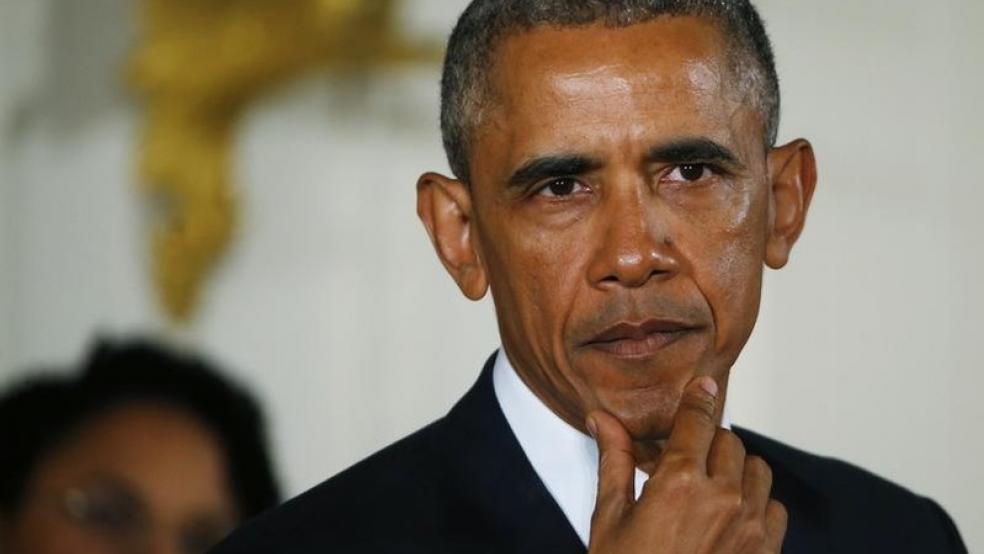In his final State of the Union address, President Obama gave the greatest defense to date of his foreign policy strategy, and particularly his approach to the fight against ISIS, arguing his efforts had kept the country safe in a time of “extraordinary change.”
The president took direct aim at his critics, both on Capitol Hill and on the 2016 campaign trail, who have, often in highly personal terms, bludgeoned him over his handling of world affairs.
Related: The Big Challenge in Obama’s Final State of the Union Address
Obama said such criticism, like charges that America’s economy is in decline, is “political hot air.”
“The United States of America is the most powerful nation on Earth. Period. It’s not even close,” the president said. “We spend more on our military than the next eight nations combined. Our troops are the finest fighting force in the history of the world. No nation dares to attack us or our allies because they know that’s the path to ruin. Surveys show our standing around the world is higher than when I was elected to this office, and when it comes to every important international issue, people of the world do not look to Beijing or Moscow to lead. They call us.”
Obama devoted the lion’s share of the speech’s foreign policy section to the war on ISIS, acknowledging the threat posed by terror groups like it and al-Qaeda. But he pushed back against the type of rhetoric that has become a trademark of the GOP presidential primary.
“But as we focus on destroying ISIL, over-the-top claims that this is World War III just play into their hands,” Obama said, in what may have been a jab at Donald Trump and Sen. Marco Rubio (FL), who have painted the conflict as a war between civilizations. “Masses of fighters on the back of pickup trucks, twisted souls plotting in apartments or garages — they pose an enormous danger to civilians, they have to be stopped, but they do not threaten our national existence.”
The president rattled off familiar talking points about the progress being made by the U.S.-led coalition against ISIS, including nearly 10,000 airstrikes and reclaiming territory in Iraq and Syria. He also called on lawmakers to vote on a new war powers resolution.
“Take a vote,” he said. “But the American people should know that with or without Congressional action, ISIL will learn the same lessons as terrorists before them. If you doubt America’s commitment — or mine — to see that justice is done, ask Osama bin Laden.”
Related: ISIS Cash Goes Up in Smoke as US Targets Terror Group’s Finances
The president touched on other global hot spots like Afghanistan, Pakistan and Africa, as places where extremists are establishing safe havens.
“The world will look to us to help solve these problems, and our answer needs to be more than tough talk or calls to carpet bomb civilians. That may work as a TV sound bite, but it doesn’t pass muster on the world stage,” he told the chamber, taking aim at Sen. Ted Cruz (TX), another Republican presidential contender who skipped the address to be on the campaign trail.
In an interview with NBC News, Cruz responded by again criticizing the president for not using the words “radical Islamic terrorism” and not mentioning recent attacks. “He didn’t say a word about the Paris terror attacks. He didn’t say a word about San Bernardino. He didn’t say a word about the Philadelphia police officer who was shot 13 times by a terrorist pledging allegiance to ISIS,” Cruz said. “And I think the American people, they’re tired of having a president who will not even acknowledge the evil we’re facing, much less do anything serious to stop it.”
In his speech, Obama also made no mention of the fact that two U.S. Navy boats had been seized in the Persian Gulf by Iran and 10 sailors stand accused of spying. While the situation has yet to play itself out, the absence could come back to haunt the president. Republicans lawmakers criticized the omission.
But Obama’s State of the Union address was focused less on specific situations and more on broad principles about America’s leadership role in the world, as when the president once again dug in his heels against the idea of deploying U.S. forces to “every country that falls into crisis.”
“That’s not leadership; that’s a recipe for quagmire, spilling American blood and treasure that ultimately weakens us,” he said. “It’s the lesson of Vietnam, of Iraq — and we should have learned it by now.”





